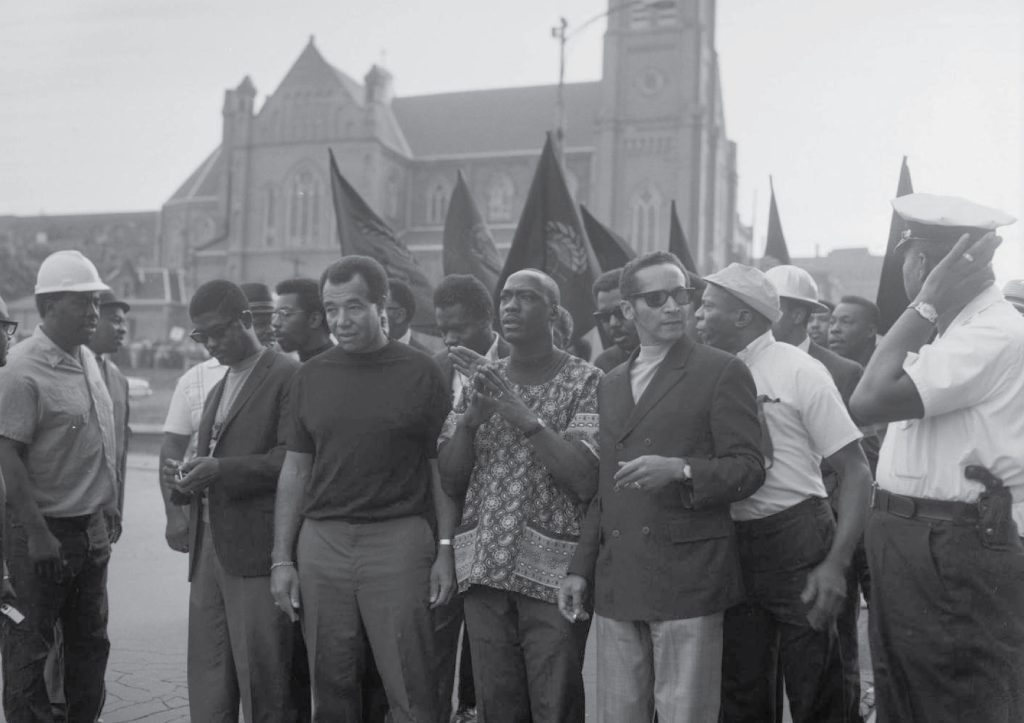Statements of Solidarity

PHOTO: “Black Monday” demonstration with Mike Desmond, Rev. Jimmy Joe Robinson, Nate Smith, and Byrd Brown in front, and others including Lloyd Bell, Dr. Norman Johnson, Aaron Mann, Louis Boykins, Vince “Roots” Wilson, police officer William “Mugsy” Moore, James “Swampman” Williams, and Matthew Moore, Freedom Corner, Lower Hill District, September 1969. © Carnegie Museum of Art, Charles “Teenie” Harris Archive.
Written by Samuel W Black, director of our museum’s African American Program, on behalf of the Heinz History Center.
Like so many, we strongly condemn the unnecessary killing of George Floyd in Minneapolis, Minn., Breonna Taylor in Louisville, Ky., Ahmaud Arbery in Glynn County, Ga., and other Black men and women in the recent months. These killings are a product of systemic racism and shatter our notion of a free and democratic society.
Whether people are sitting at home watching television, bird watching in Central Park, or driving with their family near a college campus, they should not be targeted for death. Americans of all racial backgrounds, social status, and persuasions have come together to express outrage at these and other killings. Their voices of frustration, disappointment, and fear accompany calls for peace, justice, and equality.
As Pittsburgh’s “people museum,” the Heinz History Center educates, stimulates, and unites people of all races here in Western Pennsylvania. Our endless work to preserve and interpret our region’s African American history tells us that these recent killings are not isolated incidents.
As the History Center commemorates the 15th and 19th Amendments this year, we’re also reminded of racial attacks and riots on African Americans between 1919 and 1923 in Chicago, Ill.; Tulsa, Okla.; Millen, Ga.; Washington, D.C.; Philadelphia, Pa.; and Rosewood, Fla.
Closer to home, the memories of Jonny Gammage, Jerry Jackson, Leon Ford, and Antwon Rose ring clear when telling local stories of conflict between police and the African American community. The outrage then, and the outrage now, is real. Our understanding of history is that although dark days have existed and trauma has been present in many peoples’ lives, so has triumph and unity as a people. Our society has always found ways to bring peace, but now we must find a way to bring justice and fight racism.
From our recent struggles related to the COVID-19 pandemic to the senseless murder of African Americans, the History Center stands with our community as we strive to bring peace and unity to our region.
America Under Stress
An introduction by Andy Masich, president and CEO of the Heinz History Center:
Our nation now faces a perfect storm of crises. While history is replete with examples of pandemics leading to economic distress resulting in social unrest and revolutions, it’s not the same as living through such times.
The tragic death of George Floyd has served to expose injustices that have long been woven into the fabric of America. Robert Hill, the Heinz History Center’s African American Advisory Council chairman, well expresses the emotions that now reflect the mood of our organization and our community. It reinforces the notion that our democracy is a work in progress, and it’s time for us all to roll up our sleeves and get to work building a more perfect union rooted in the belief that all are created equal.
Written by Robert Hill, chairman of the Heinz History Center’s African American Advisory Council:
As America grapples these days with the grave multilayered reality that informs life in virtually every corner of our nation, two facts must be noted. The first inescapable truth is that George Floyd is dead. Yet another young man in police custody met his demise on May 25, 2020, after being caught living while black in Minneapolis, Minnesota. Unarmed, apparently compliant, and begging for his life, Mr. Floyd was released from the death-grip of three police officers—with a fourth standing watch—just before his lifeless body was carried by ambulance to a hospital where he was pronounced dead.
That fact produced the second. In a historic rainbow of American humanity, white and African American, and other citizens of every color and race—mostly young adults— have joined together to peacefully protest the horrifying death and to demand criminal justice. In the four centuries since Blacks—enslaved and liberated—have resided on these shores, this largest, broadest, and nationwide merging of young people in the cause of racial justice presents the most propitious moment for Americans to forge a more pervasively egalitarian society than the America we inherited.
The Heinz History Center hopes that the Floyd family knows peace and justice and that the moment to vanquish hate is not squandered on an uncertain nation. As the late great Maya Angelou observed, hate is the cause of countless problems yet the solution to not one.
Updated July 2020.